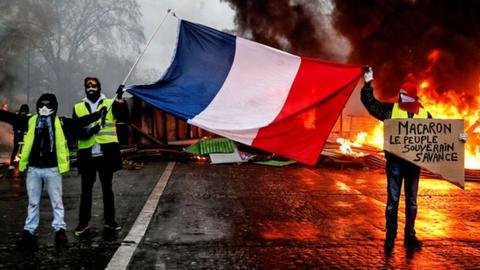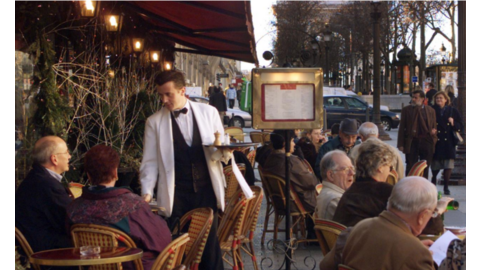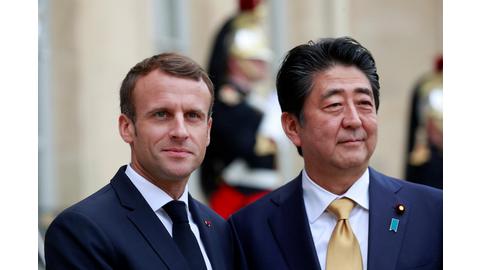Technology: Macron thinks big in vision for French unicorns

A start-up boom prompts new president’s attempt to foster homegrown companies in US-dominated industry
Last summer Michael Amar, a serial entrepreneur and investor, met Emmanuel Macron at a private networking event at the British Embassy in Paris.Mr Amar, a Frenchman who had swapped Paris for Palo Alto in California in 2008, recalls telling Mr Macron, who had recently set up a political movement, En Marche: “If you become president of France, I will come back.
”Following Mr Macron’s election in May, Mr Amar was as good as his word and moved back to France this summer. “I had wanted to come back to France for a couple of years but the mood wasn’t great,” says Mr Amar, who once owned advertising and media companies and now runs a digital rewards platform called Ifeelgoods.
“I waited for the outcome of the election.” The election of a start-up politician to the presidency has come at a crucial time for France’s technology start-ups.
In recent years, France has made impressive strides in creating new tech businesses and encouraging entrepreneurs in a country where rigid labour laws and high taxes were once — and still can be — a huge disincentive.
Yet just as Mr Macron faces enormous challenges in pushing through the labour market and fiscal reforms he has pledged, France’s tech sector wants to pull off a trick that has eluded many European countries for decades — the creation of a group of internationally successful, billion-dollar companies.
“The question is how to turn France from start-up to scale-up nation,” says Nicolas Dufourcq, head of Bpifrance, the public investment bank that is the country’s biggest investor in start-ups.
“What we’re trying to do now is to improve the chances of those start-up companies to become worldwide leaders.” Mr Macron agrees. “I want this country to become a country of unicorns [private companies valued at more than $1bn],” he said at the VivaTech conference in Paris in June.
There is growing momentum. Investment in France accelerated last year and hit a record of €2.2bn from 574 fundraisings, according to EY.
France accounted for a fifth of the funds raised in Europe in 2016, up from 13 per cent the year before and putting it roughly on a par with Germany and both of them behind only the UK. The trend has continued this year.
If the pace of activity in the first six months of 2017 continues in the second half, France would surpass the number of 2016 deals by 40 per cent, and almost double the total dollar funding, according to CB Insights.
Within the tech sector, France’s advantage lies in areas such as software, healthcare, deep tech and artificial intelligence — reflecting the strength of its engineering schools. The issue of scaling up new companies is one facing all European countries as the region steps up the fight to produce more global leaders that can compete with Silicon Valley.
Europe is still dwarfed by the US and Asia. European start-ups raised a total of $4.4bn in the second quarter of 2017, compared with $18.8bn raised by US start-ups and $19.3bn raised in Asia, according to PwC. European capitals are jostling to lure talent following the UK’s vote for Brexit and the US election of President Donald Trump last year.
Both countries have pledged to crack down on immigration — a leading source of tech talent. Yet many in the industry note that, while competition between cities is inevitable, no European country has a big enough market to succeed on its own. Success in one helps the others.
“European tech is accelerating across all countries,” says Yann de Vries, a partner at venture capital firm Atomico in London. “It’s not a zero-sum game.” Looming over France’s efforts is the godfather of French tech, Xavier Niel.
The self-made billionaire created a start-up on the Minitel, a forerunner to the internet in France, at the age of 19, and in 2009 shook up the country’s mobile telecoms sector with the launch of Free, a low-cost fourth provider. Mr Niel founded 42, a non-profit computer programming school in Paris, in 2013.
His latest project is Station F, a 34,000 sq metre former railway station that symbolises the scale of France’s start-up ambitions. Situated in Paris’s fast-developing 13th arrondissement and backed with €250m from Mr Niel, Station F opened in June.
The building is becoming a microcosm of what’s happening in France. Station F will house 1,000 start-ups, as well as corporate partners such as Facebook, Microsoft and South Korea’s Naver, investors, service providers and incubators of business schools like HEC.
For Mr Niel, creating more big companies in France is a numbers game. “It’s a statistical question,” he says. “The more start-ups you create the more chance there is of having more unicorns. Our work today is to ensure plenty of start-ups are launched. We haven’t created enough.” Roxanne Varza, director of Station F, is focused on making the operation as cosmopolitan as possible.
“One thing we still don’t have in France is a very international talent pool,” she says. “We strived to make the whole of the Station F campus international from day one.” Station F received 2,300 applications for its inaugural Founders programme from 50 countries as far afield as Nepal and Jamaica.
The US, the UK and China emerged as the top three countries by number of applications. About a third of the almost 200 start-ups selected for the scheme are international. Crucially, Station F only accepts applications in English.
“We want people to know that it’s an international environment, it’s not a Franco-French project,” says Ms Varza. Stanislas Niox-Chateau, co-founder of Doctolib, an online booking service for doctors and dentists, expresses the mixed sentiments of many young French entrepreneurs, saying: “For me, France is the best country in the world to set up a company: the state helps you and there’s a lot of talent in the engineering schools. However, it’s harder and more complicated to raise growth capital in France than in the UK or the US.”
Funding in France is still dominated by early-stage funding and lacks the next stage of investment — growth capital — to help companies scale up. During the second quarter of 2017, France’s average funding round was $8.7m, lower than both Germany’s ($11.5m) and the UK’s ($10.3m), according to CB Insights.
This reflects the fact that France has the greatest proportion of early-stage deals of the three countries. An abundance of funding for start-ups means it can take longer for bad ideas to be weeded out. Some people argue that it has also distorted incentives and made some entrepreneurs prize a short-term financial gain over building a long-term vision.
“It’s terrible to be a start-up nation,” says Jacques-Antoine Granjon, founder of ecommerce site Vente-Privee.com, one of a handful of French unicorns. “Some people think short term without ambition. They are often happy with small money. Most think more about selling than creating.
They’re not fully committed.” Gradually more growth capital is becoming available, as larger US investors look to increase their exposure to France. From within the country, Bpifrance has raised a €1bn fund to invest stakes of €10m in growing companies.
In June Artemis, the investment vehicle of France’s Pinault family, unveiled a €100m fund that will invest stakes worth €5m-€50m in French tech companies and help accelerate their commercial position in the US. The US remains a more attractive location for new tech ideas.
As well as a greater number of serial entrepreneurs in the US, and more active corporate buyers, start-ups launching in the US have one important advantage over those who begin in Europe: the market on their doorstep. While the EU (population 508m) is actually bigger than the US (323m), the US is a single homogeneous market rather than a sum of many disparate parts. This offers US start-ups the potential to scale up large companies without leaving their home market.
“Our challenge is that the European single market does not truly exist,” says Pia D’Iribarne at venture capital firm Accel Partners. “And this is not a French problem, it’s a European problem. If you want to expand in Europe you have to launch from scratch in each individual country, where there are differences in rules, in languages, in taxation. Anything that can be done to smooth that out and break down boundaries will make it easier to build large companies in Europe.”
It is also harder for entrepreneurs in France to exit their companies, with no equivalent of the US Nasdaq index. “To build a huge company in France the only option you have is to sell to the US or build a huge standalone company in Europe,” says Jean de La Rochebrochard, a partner at Kima Ventures, Mr Niel’s venture capital arm that aims to back two start-ups a week.
Prospective buyers in France have largely been late to the game. Mr de La Rochebrochard says: “We have an environment that doesn’t nurture companies because the corporates are old and odd.” Aware of such disadvantages, successful entrepreneurs are doing their bit to support the next generation. Initiatives include the WonderLeon project to attract international tech talent to Europe, and the Galion Project to help companies scale up their operations.
Set up by JB Rudelle, co-founder of the digital advertising company Criteo, the Galion Project offers start-ups a series of template documents, including a term sheet for a first funding round and a contract for distributing employee stock options.
Criteo, founded in 2005 and listed on the Nasdaq in 2013, is an early poster child for French tech. “It takes time to build an ecosystem,” says Mr Rudelle. “You need a full cycle of successful entrepreneurs that creates a model for those coming after them. Five to 10 years down the line it will be a different picture.” French corporates are stepping up their participation in the start-up scene.
More and more successful exits are starting to emerge. Zenly, a social mapping app, was sold to Snap in June for $300m, and video ad platform Teads was sold to Altice in March for $300m.
Such deals are encouraging a new crop of entrepreneurs who are not afraid to think big from day one. “There’s a lot more risk takers in our generation,” says 25-year-old Gaspar Schmitt, who in 2015 co-founded Side, an online business that matches temporary workers with companies.
Mr Schmitt says: “Our ambition was international from the very beginning. We’re not building Side to be acquired by anyone; we want to build a new labour market that didn’t exist before.” At Station F’s launch party in June, where some 2,000 people attended, young tech hopefuls queued up to speak to the likes of Mr Niel and Mr Granjon, hoping to snap a selfie or receive a pearl of wisdom. While Mr Macron’s poll rating among the broader population is fading as the initial excitement around his election recedes, the mood among French start-ups is exuberant.
“The thing that’s more important than anything is hope,” says Mr Niel. “Am I in a place, a town, a country that gives me the feeling that I can succeed? Macron is capable of making young people dream. That changes the entire perception of a country.”
Source: https://www.ft.com/content/61c5f20a-81a8-11e7-a4ce-15b2513cb3ff


